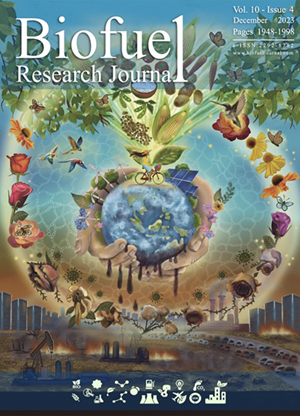Bio-oil yield and quality enhancement through fast pyrolysis and fractional condensation concepts
IF 11.9
Q1 ENERGY & FUELS
引用次数: 32
Abstract
The influence of operating conditions on the yield and quality of bio-oil obtained from black spruce wood mixture was studied using an auger reactor. Fast pyrolysis optimization through response surface analysis was carried out with four variables: pyrolysis temperature, solids residence time, nitrogen flow, and temperature of first stage of condensation. The optimal conditions obtained for bio-oil production were 555°C, 129 s, 6.9 L/min, and 120°C, respectively. The product yields were 38.61 wt.% of biochar, 25.39 wt.% of liquid, and 36.52 wt.% of non-condensable gases. Two liquid products were produced at the exit of the two condensers, following the concept of fractional condensation. The oily phase yield recovered in the first condenser was 10.59 wt.%, with a 16.86 wt.% of moisture content. Physical properties of the oily phase were analyzed and compared with the ASTM standard D7544-12. Qualitative identification of chemical compounds was carried out for the oily phase which helped in pyrolysis optimization for the bio-oil production targeted towards its use as fuel in commercial burners. In addition, the oil produced here is one of the lowest in water and solids content, attributable to the unique feature of auger reactors without the need for additional treatments.通过快速热解和分馏冷凝概念提高生物油收率和质量
采用螺旋反应器研究了操作条件对黑云杉木混合液生物油收率和质量的影响。通过响应面分析,选取热解温度、固体停留时间、氮气流量、一段冷凝温度4个变量进行快速热解优化。生物油的最佳产油条件分别为555℃、129 s、6.9 L/min和120℃。产物产率为38.61 wt.%的生物炭,25.39 wt.%的液体和36.52 wt.%的不可冷凝气体。在两个冷凝器的出口处产生两种液体产品,遵循分式冷凝的概念。在第一冷凝器中回收的油相收率为10.59 wt.%,其中水分含量为16.86 wt.%。分析了油相的物理性质,并与ASTM标准D7544-12进行了比较。对油相进行了化合物的定性鉴定,这有助于生物油生产的热解优化,目标是将其作为商业燃烧器的燃料。此外,由于螺旋钻反应器的独特特点,无需额外的处理,这里生产的油是水和固体含量最低的油之一。
本文章由计算机程序翻译,如有差异,请以英文原文为准。
求助全文
约1分钟内获得全文
求助全文
来源期刊

Biofuel Research Journal-BRJ
ENERGY & FUELS-
CiteScore
22.10
自引率
1.50%
发文量
15
审稿时长
8 weeks
期刊介绍:
Biofuel Research Journal (BRJ) is a leading, peer-reviewed academic journal that focuses on high-quality research in the field of biofuels, bioproducts, and biomass-derived materials and technologies. The journal's primary goal is to contribute to the advancement of knowledge and understanding in the areas of sustainable energy solutions, environmental protection, and the circular economy. BRJ accepts various types of articles, including original research papers, review papers, case studies, short communications, and hypotheses. The specific areas covered by the journal include Biofuels and Bioproducts, Biomass Valorization, Biomass-Derived Materials for Energy and Storage Systems, Techno-Economic and Environmental Assessments, Climate Change and Sustainability, and Biofuels and Bioproducts in Circular Economy, among others. BRJ actively encourages interdisciplinary collaborations among researchers, engineers, scientists, policymakers, and industry experts to facilitate the adoption of sustainable energy solutions and promote a greener future. The journal maintains rigorous standards of peer review and editorial integrity to ensure that only impactful and high-quality research is published. Currently, BRJ is indexed by several prominent databases such as Web of Science, CAS Databases, Directory of Open Access Journals, Scimago Journal Rank, Scopus, Google Scholar, Elektronische Zeitschriftenbibliothek EZB, et al.
 求助内容:
求助内容: 应助结果提醒方式:
应助结果提醒方式:


